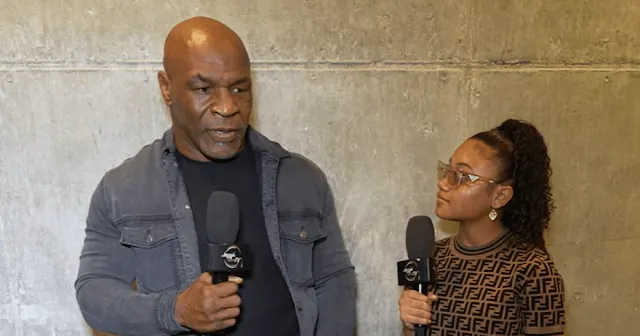Mike Tyson, the former heavyweight boxing champion of the world, is a name synonymous with ferocity, power, and dominance. With a career defined by knockouts and an intimidating presence inside the ring, one might expect his voice to match his formidable persona. However, Tyson's high-pitched, lisped voice has often been a topic of public curiosity and, at times, ridicule. Many wonder why a man of his stature speaks in such a unique manner. Let’s delve into the reasons behind Mike Tyson’s distinct voice and the broader implications of such perceptions.
The Origins of Mike Tyson’s Voice
Mike Tyson's voice is characterized by a high pitch and a noticeable lisp, which has been present since his childhood. This vocal trait can be attributed to a combination of physiological, environmental, and emotional factors.
1. Physiological Factors
Tyson has a congenital lisp, a speech impediment caused by the way the tongue interacts with the teeth and palate. A lisp can make "s" sounds come out as "th," which is a common feature in his speech. While speech therapy can help mitigate this condition, Tyson’s lisp has remained a prominent part of his vocal identity.
Additionally, the pitch of a person's voice is influenced by the size and shape of the vocal cords and larynx. Despite his physical build, Tyson's vocal cords may naturally produce a higher-pitched tone. This physiological makeup is not uncommon and is entirely unrelated to his boxing prowess or masculinity.
2. Environmental Influences
Tyson grew up in the Brownsville neighborhood of Brooklyn, New York, an area known for its tough streets and high crime rates. As a child, he faced bullying and ridicule, partly because of his voice. These experiences likely shaped his communication style, as he learned to navigate a harsh environment where vulnerability was often exploited.
The Contrast Between Voice and Persona
The disparity between Tyson’s voice and his physicality creates a jarring effect for many people. Standing at 5 feet 10 inches tall and weighing over 200 pounds in his prime, Tyson exudes a powerful, commanding presence. However, when he speaks, his voice seems at odds with the aggressive, alpha-male image typically associated with heavyweight boxing champions.
Cultural Expectations and Stereotypes
Society often ties vocal pitch and tone to gender and strength. Deep voices are stereotypically associated with masculinity, authority, and power, while higher-pitched voices are unfairly linked to weakness or femininity. These stereotypes can lead to biased perceptions of individuals like Tyson, whose voice does not conform to these societal norms.
Tyson himself has embraced his unique voice, using it to disarm expectations and connect with people on a more human level. His openness about his vulnerabilities and struggles, including his voice, has endeared him to fans worldwide.
Public Reactions and Misinterpretations
Tyson’s voice has been the subject of imitation, parody, and mockery in pop culture. While some impressions are made in good humor, others have perpetuated negative stereotypes. Over time, Tyson has shown remarkable resilience in dealing with these reactions.
Challenges in the Public Eye
As a public figure, Tyson’s voice has been scrutinized more than most people’s. Early in his career, some questioned whether his voice undermined his ability to intimidate opponents. However, his devastating knockouts and unmatched skill in the ring quickly silenced such doubts.
Turning Weakness into Strength
In interviews and his one-man Broadway show, Mike Tyson: Undisputed Truth, Tyson has spoken candidly about his life experiences, including his voice. By confronting the ridicule and turning it into a talking point, he has taken control of the narrative, transforming what some viewed as a weakness into a symbol of authenticity.
Emotional and Psychological Impact
Tyson's unique voice also reflects his emotional depth and sensitivity, traits that are often overshadowed by his boxing legend. Growing up in an abusive household and later losing his mentor, Cus D’Amato, Tyson endured significant trauma. His voice, in many ways, serves as a reminder of his inner child—a child who faced immense hardship but also had a tender side.
The Connection to Vulnerability
Tyson has often spoken about feeling like a "scared little boy" despite his fearsome reputation. His voice, combined with his candid admissions, offers a glimpse into the man behind the fighter—a person who has battled insecurities, mental health challenges, and a tumultuous personal life.
Breaking Down Barriers
In a society that often stigmatizes vulnerability, Tyson’s openness is a powerful example of breaking stereotypes. His voice and his willingness to discuss its implications challenge the traditional notions of masculinity, showing that strength and sensitivity can coexist.
Lessons from Tyson’s Journey
Mike Tyson’s story is not just about boxing; it’s about resilience, self-acceptance, and redefining societal expectations. His voice, once a source of ridicule, has become a defining characteristic that sets him apart.
Embracing Uniqueness
Tyson’s journey teaches us the value of embracing our differences. Whether it’s a unique voice, a physical trait, or a personal struggle, our individuality is what makes us human. Tyson’s voice is a testament to his authenticity, reminding us that true strength lies in owning who we are.
Challenging Stereotypes
By defying the stereotypes associated with his voice, Tyson challenges us to reconsider our biases. A person’s voice, appearance, or other superficial traits do not determine their worth or capabilities. Tyson’s legacy proves that actions speak louder than societal expectations.
Conclusion
Mike Tyson’s voice is as unique as the man himself—a blend of contrasts that defy easy categorization. While his high-pitched, lisped speech might seem incongruous with his boxing persona, it’s a crucial part of his identity. It reflects his vulnerabilities, resilience, and ability to rise above adversity.
In a world that often judges based on appearances and preconceived notions, Tyson’s story reminds us to look beyond the surface. His voice may not fit the traditional mold, but it carries the weight of a life filled with triumphs and tribulations. And in the end, it’s not the pitch of his voice but the strength of his character that truly defines him.








Social Plugin